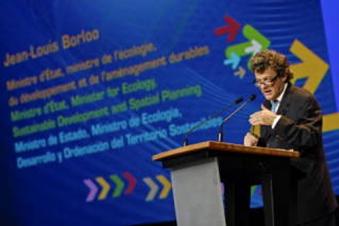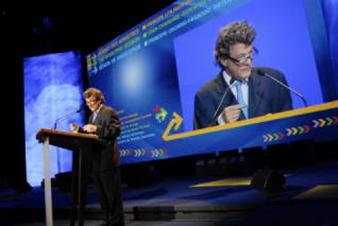During discussions with the various parties, it becomes abundantly clear that the apparent contradictions (between economic development and environment) are in reality difficult to manage. As the public gains awareness of these contradictions, public action seems more heavily impeded. And there's a reason for this: the subject is overly compartmentalized. Each participant's perspective is self-contained: roads on one side, rail on the other, and then the environment on yet another side.
With the creation of this Ministry of Ecology and Sustainable Development and Planning, France has sought to break down the barriers existing between these priorities. I occupy the post of Minister of Roads, Rail, Ecology, regional planning and housing. Why such a jumbo ministry you may ask? Because we have come to realize that in any attempt to combat global warming, it's impossible to focus on roads without discussing rail, planning policy, building patterns, etc.
We have also launched a comprehensive conference for stakeholders during which, for the very first time, all actors in the drive for sustainable development are seated around the same table and discuss. Nothing advances unless everyone is able to work together.
For this reason, roads to my mind do not constitute an isolated component, but instead serve as one means of communication between two others - an overlap between two other trip-making modes.
But the road is also a fabulous technological leverage to counter global warming and, more broadly, mitigate environmental nuisances.
My thoughts turn first to two French, PIARC award-winning projects:
The first is dedicated to replacing the asphalt binders in road mixes with plant binders. Such a step would lead to replacing the oil component by renewable resources, offering absolutely identical performance in terms of durability and strength.
The second project promotes the production of mix materials that can be spread on pavements at a temperature of between 120 and 140 degrees instead of 180, which means less energy required for spreading and hence fewer greenhouse gas emissions.
Yet the technology is available to go further yet. Here, I'm thinking for example of a totally revolutionary experimental project whereby the bitumen is able to directly counteract the pollution generated: surfacing made of titanium oxides serve to destroy nitrogen oxides and attack the very root cause of polluting emissions.
While on this subject, I'd like to point out that France has, in the area of maintenance, civil engineering, and bridge and airport construction, developed a level of expertise recognized the world over. Even though we must cope with some weaknesses, such as our small and medium-sized enterprises, we remain well ahead of the field in managing complex systems. I have therefore also come to tell you that should you be considering investment opportunities, please count on me to mobilize the corresponding French industrial sectors to respond to your potential plans.
I am even ready to organize an international meeting with leading representatives of our advanced technical programs in order to lead your projects to fruition.
In conclusion, these reflective sessions provide for me a real source of satisfaction and at the same time hope. At a time when the world is celebrating the 20th anniversary of the Montreal Protocol, I believe more than ever that we are indeed capable of reversing the prevailing trends on a durable basis. And this Congress offers proof: we now possess the technologies to act, but implementing a real action plan will require bold political leadership.

